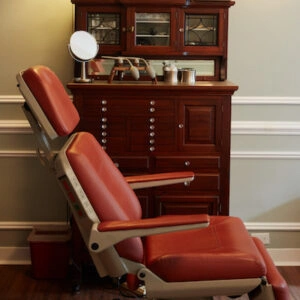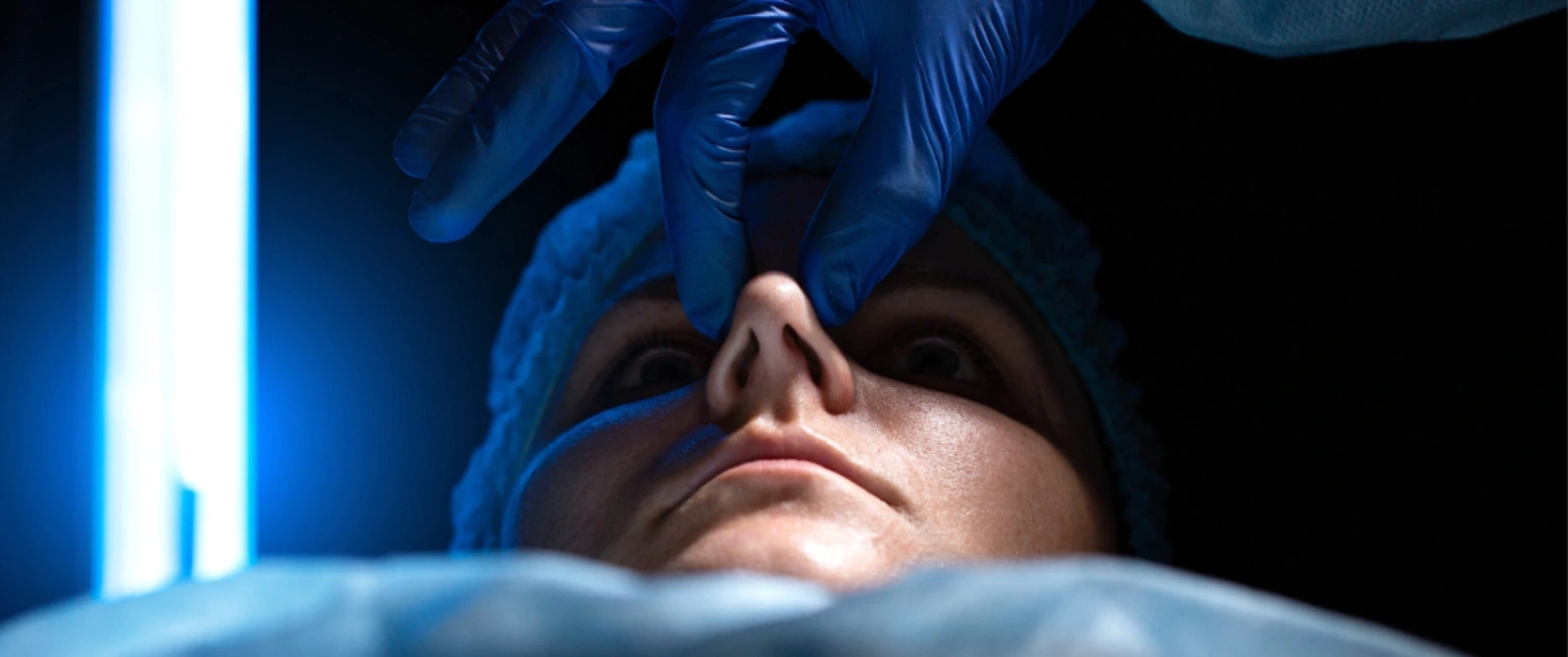Breathe well again and avoid infections with sinus surgery
With over a decade of experience, Dr. Mourad has helped countless patients, including many from Manhattan, find relief from sinus-related issues such as sinusitis, nasal congestion, headaches, and more. Using the latest techniques and technology, he provides effective, personalized care tailored to each patient’s needs. If you are in Manhattan and dealing with chronic sinus pain or difficulty breathing, Dr. Mourad is committed to helping you achieve relief and improve your overall quality of life.
Book an appointment to determine if you need sinus surgery in Manhattan
What is sinus surgery?
The internal structure of your nose consists of small cavities and passageways that interconnect with each other and communicate with both sides of the nasal passages. Sinus surgery works to enlarge these channels and remove portions of the walls within these spaces, which helps prevent blockage and allows for more effective drainage. By creating wider and more open sinus passages, pressure within the nose is reduced, and the frequency as well as the severity of sinus infections can be significantly decreased. In addition, more accessible sinus spaces enable saline rinses and topical medications to reach the affected areas more efficiently, enhancing overall treatment effectiveness.
What are the different types of sinus surgery?
The primary surgical approaches used to improve sinus drainage include Functional Endoscopic Sinus Surgery, commonly referred to as FESS, and Balloon Sinuplasty. In cases of revision surgery or when sinuses adjacent to the eyes or brain are affected, surgeons may also employ Image Guidance technology to ensure precise and safe navigation during the procedure.
Functional endoscopic sinus surgery (FESS)
In some instances, a three-dimensional navigation system is utilized, which integrates information from your CAT scan to provide real-time guidance of instruments inside the nasal cavity and sinuses. This technology allows the surgeon to accurately determine the exact location within the sinuses and can be used in conjunction with Functional Endoscopic Sinus Surgery or certain types of Balloon Sinuplasty procedures. Image guidance is particularly valuable in revision surgeries or when operating on the frontal, lateral ethmoid, or sphenoid sinuses that are situated near the brain, eyes, and critical nerves and blood vessels in the head.
Image-guided surgery (IGS)
Functional Endoscopic Sinus Surgery, or FESS, is the most frequently performed type of sinus surgery. The procedure is carried out using an endoscope, which is a thin, flexible tube equipped with a light and a small camera at its tip. This device is gently inserted through the nasal passages, allowing the surgeon to obtain a clear and magnified view of the interior of the sinuses. Once inside, the surgeon can carefully remove any obstructions, such as nasal polyps, bone spurs, or other tissue that may be blocking proper airflow and drainage. The openings of the sinuses are then widened to facilitate improved drainage and reduce inflammation. FESS is generally performed under general anesthesia, and the duration of the surgery may vary depending on the complexity of each individual case.
Balloon Sinuplasty
Balloon sinuplasty is a minimally invasive sinus procedure designed to open blocked sinus passages using a small balloon catheter. During the procedure, a wire guide is carefully positioned into the larger sinus cavities, and the balloon is then advanced into the sinus opening. Once in place, the balloon is gently expanded with water, enlarging the sinus passage and improving drainage. This technique can be applied to three of the four major sinus cavities but does not involve removing infected or inflamed sinus tissue. Balloon sinuplasty is generally not suitable for patients who have nasal polyps or ethmoid sinus disease, as these conditions require more extensive intervention.
Open sinus surgery
In certain cases, more traditional sinus surgery is necessary. This less common approach involves making small incisions, typically on the upper lip or inside the nostrils, allowing the surgeon direct access to the sinuses. This method enables the removal of obstructive tissue or other blockages that cannot be addressed through minimally invasive techniques.
Transoral endoscopic surgery
A newer and developing approach involves accessing the sinuses through the mouth. Using an endoscope, the surgeon can carefully remove any tissue or blockages causing infection. This technique avoids external incisions, making the procedure less invasive while still providing effective sinus drainage and relief from chronic sinus issues.
Discuss risks associated with each sinus surgery option with Dr. Mourad
It is essential to understand that the various types of sinus surgery each have specific indications, advantages, and potential risks. The appropriate procedure will depend entirely on the patient’s individual condition, anatomy, and medical history. Your doctor will take the time to discuss all possible options, explain the benefits and risks associated with each approach, and guide you in determining whether sinus surgery is the best course of action for your situation.
When is sinus surgery required?
Acute sinusitis refers to a sinus infection that persists for less than one month, while chronic sinusitis is characterized by a long-lasting infection that does not respond to conventional treatments such as antibiotics or steroid therapy. Both conditions can greatly reduce overall quality of life, interfering with daily activities and causing ongoing discomfort.
Individuals who experience multiple episodes of acute sinusitis in a single year or those suffering from chronic sinusitis that has not improved with medical management are typically strong candidates for sinus surgery. The decline in quality of life may include frequent or prolonged absences from work or school, persistent symptoms, feelings of fatigue, or even emotional distress such as depression. Patients experiencing these issues should consider consulting with Dr. Mourad to explore whether surgical intervention could provide relief and improve their day-to-day well-being.
Individuals who experience multiple episodes of acute sinusitis in a single year or those suffering from chronic sinusitis that has not improved with medical management are typically strong candidates for sinus surgery. The decline in quality of life may include frequent or prolonged absences from work or school, persistent symptoms, feelings of fatigue, or even emotional distress such as depression. Patients experiencing these issues should consider consulting with Dr. Mourad to explore whether surgical intervention could provide relief and improve their day-to-day well-being.
Recurring infections
Some patients experience recurrent sinus infections even after trying standard medical treatments, including antibiotics, nasal sprays, or steroid therapies. For these individuals, sinus surgery may be recommended as a way to improve overall sinus health, enhance drainage, and reduce the frequency of future infections. By addressing underlying structural issues, surgical intervention can provide long-term relief and improve quality of life.
Chronic sinusitis
Chronic sinusitis is a persistent condition where the sinuses remain inflamed over an extended period, often resulting in symptoms such as facial pain, pressure, nasal congestion, headaches, and a diminished sense of smell. In many cases, chronic sinusitis does not respond adequately to conservative measures like medications, nasal irrigation, or lifestyle modifications. Surgery may be necessary to remove blockages, widen sinus passages, and restore proper sinus function, helping patients breathe easier and experience fewer symptoms.
Nasal polyps
Nasal polyps are soft, noncancerous growths that can form within the nasal passages or sinus openings, often obstructing airflow and contributing to chronic infections. Sinus surgery can effectively remove these polyps, alleviate obstruction, and promote healthier sinus function, providing relief from ongoing sinus-related discomfort and helping prevent future episodes of sinusitis.
Structural problems
Structural abnormalities within the nasal passages, such as a deviated septum or enlarged turbinates, can obstruct airflow and impair sinus drainage, often contributing to recurrent or chronic sinus infections. In such cases, sinus surgery may be recommended to correct these structural issues, restore proper airflow, and improve overall sinus function. By addressing the root causes of blockage, surgery can provide long-term relief from sinus-related discomfort and reduce the frequency of infections.
It is essential to understand that not every sinus issue requires surgical intervention. The decision to undergo sinus surgery should be made carefully in consultation with a qualified otolaryngologist, such as Dr. Moustafa Mourad, who has specialized expertise in sinus surgery. Through a thorough evaluation of symptoms, imaging studies, and prior treatments, Dr. Mourad can determine whether surgery is the most appropriate option for achieving lasting sinus health.
It is essential to understand that not every sinus issue requires surgical intervention. The decision to undergo sinus surgery should be made carefully in consultation with a qualified otolaryngologist, such as Dr. Moustafa Mourad, who has specialized expertise in sinus surgery. Through a thorough evaluation of symptoms, imaging studies, and prior treatments, Dr. Mourad can determine whether surgery is the most appropriate option for achieving lasting sinus health.
Get sinus surgery in Manhattan
What is a sinus infection (Sinusitis)?
Within the nasal passages, there is a network of interconnected spaces responsible for draining mucus into the nasal cavity. If these spaces become inflamed or swollen, they can become blocked, creating an environment where infection may develop. Common triggers of sinus infections include viral illnesses such as the common cold, allergic reactions like allergic rhinitis, or structural issues such as a deviated septum. Symptoms often include facial pressure or pain, persistent headaches, thick green or yellow nasal discharge, severe congestion, and fatigue. Typically, sinus infections improve within a few days with sufficient rest, proper hydration, and Vitamin C supplementation. However, if symptoms persist beyond one week or worsen suddenly, it is likely that a bacterial sinus infection has developed. In such cases, it is important to seek medical evaluation, as antibiotics may be necessary to treat the infection and prevent complications.

How do I treat my sinus infection?
During the initial days of a sinus infection, it is helpful to stay well-hydrated, get ample rest, avoid stimulants like caffeine, refrain from alcohol, and gently rinse the nasal passages with a saline solution, such as a Neti pot. Taking Vitamin C can also support the immune system and assist in recovery. If your symptoms persist for more than a week, or if you experience a sudden increase in headache intensity or notice that your nasal discharge has become thicker and more discolored, this may indicate a bacterial sinus infection that requires antibiotic treatment. Your doctor can prescribe an antibiotic specifically aimed at the bacteria most likely causing your sinus infection. In addition, your physician may recommend topical or oral steroids to help reduce inflammation and promote quicker healing within the sinuses. Consulting an otolaryngologist is particularly valuable, as these specialists possess advanced training in nasal anatomy and utilize endoscopic tools to directly examine the sinuses and provide precise, targeted care.

How can I prepare for sinus surgery?
When you schedule a consultation, you will meet with Dr. Mourad for a comprehensive session, typically lasting around an hour, during which he thoroughly reviews every aspect of your upcoming surgery. During this time, he evaluates your specific concerns and ensures that he can develop a fully individualized care plan tailored to your unique needs. He will identify the precise nature of your complaints and the underlying causes, and may recommend medications or treatments to support your health and address these concerns. Once a personalized surgical plan is established, Dr. Mourad and his staff will guide you through all necessary instructions, details, and preparations to guarantee that your procedure proceeds smoothly and efficiently, allowing you to experience your care with confidence and comfort.
Dr. Mourad views each patient relationship as a privilege and enjoys dedicating the time to understand your goals and challenges. His office offers a boutique-style environment, designed to feel welcoming, relaxing, and entirely focused on your experience rather than a typical clinical setting. This approach ensures that your care feels personal and attentive, fostering a comfortable and supportive atmosphere.
Dr. Mourad views each patient relationship as a privilege and enjoys dedicating the time to understand your goals and challenges. His office offers a boutique-style environment, designed to feel welcoming, relaxing, and entirely focused on your experience rather than a typical clinical setting. This approach ensures that your care feels personal and attentive, fostering a comfortable and supportive atmosphere.

To optimize recovery, Dr. Mourad usually recommends that patients take at least three days off work following surgery and avoid any strenuous activity or heavy lifting during this period. If you wear glasses, adjustments may be necessary. He provides all necessary medications, ointments, and nasal sprays to enhance healing and maximize your results. Follow-up visits are scheduled two weeks post-surgery and again at one month, with Dr. Mourad continuing to monitor and support his patients for many years, ensuring long-term results and maintaining the relationship built during your care.
Will insurance pay for my sinus surgery in the United States?
Nearly all insurance providers in the United States classify sinus and breathing-related procedures as functional surgeries that are typically eligible for coverage. At our office, we take the time to thoroughly review your insurance benefits prior to your appointment, ensuring that you have a clear understanding of your coverage and avoiding any unexpected surprises. We handle all the necessary paperwork, submit prior authorizations, and obtain the required approvals for your procedure. Dr. Moustafa Mourad is highly trained in a wide range of sinus and nasal surgeries, including rhinoplasty, correction of broken noses, and nasal valve repair. If you are experiencing sinus issues or breathing difficulties, please do not hesitate to contact our office so that we can provide guidance, support, and expert care tailored to your needs.
How can Dr. Mourad help you?
When patients in Manhattan reach out to our office, our friendly staff will collect your basic details and arrange an appointment at a time that works best for you. If your visit involves insurance, we will verify your benefits and explain them clearly. With our no-surprise billing policy, you will always know your financial responsibility in advance. Dr. Mourad’s extensive experience in eyelid and facial surgery ensures your aesthetic goals are addressed with skill and precision. If you are in Manhattan and would like an evaluation of your eyes or other facial features, please feel free to contact us.

